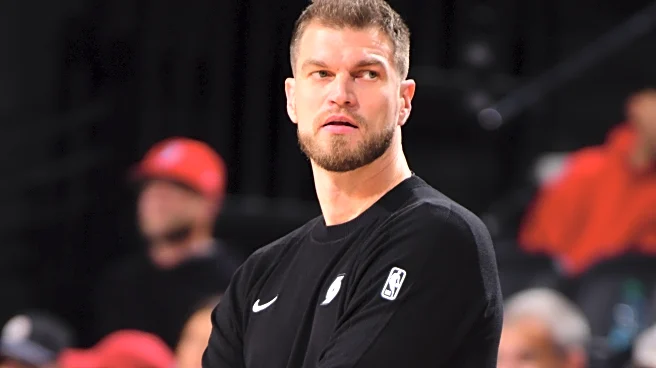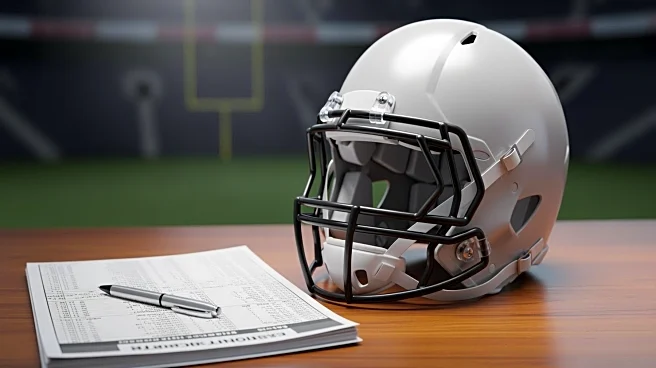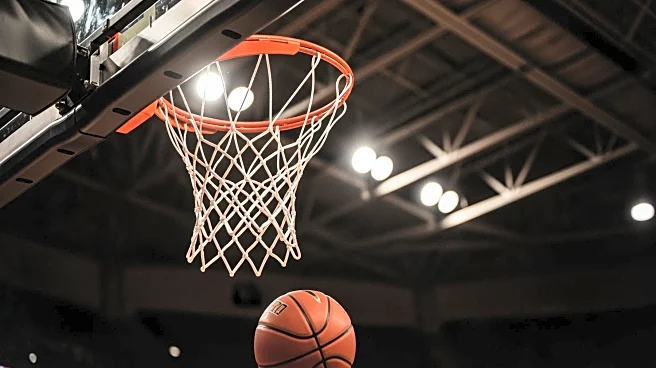The Portland Trail Blazers suffered a dispiriting loss to the Los Angeles Lakers last night. It’s the first morale-buster the franchise has endured since the unexpected Week 1 loss of their head coach Chauncey Billups. The Tiago Splitter era hasn’t been full of wins, but hard effort and upward trajectories have blossomed, along with a semi-mythical narrative surrounding these new, young Blazers.
The Lakers loss–a defeat to a team completely free of superstars LeBron James, Luka Doncic, and Austin
Reaves–seemed to pop that bubble for many Blazers fans. The Blazer’s Edge Mailbag was full of questions that amounted to, “How???” and “Why???” and “AUUUGGHHHHH!” this morning. Just when they thought the Great Pumpkin was going to arrive, Portlanders seemed to discover it was just Lucy holding a football for them once again.
Or at least that was the vibe. But is it reality?
Let’s answer some of the questions from those submissions, at least in general terms. Consider this less a direct mailbag than an omnibus response to the assorted queries.
What the Heck Happened???
Part of the shock of this loss is the fact that it came on the heels of an incredibly scrappy, positive, emotional win over the Denver Nuggets on Friday night. If the Blazers could beat what may be the second-best team in the entire Western Conference–one with a huge and indomitable MVP candidate to boot–how could they not beat a mediocre Lakers club that looked about as threatening as an armless octopus?
The two realities may have something to do with each other, though. For all their verve and drive, the Blazers are still young. Most of their players have never experienced actual winning. Some haven’t experienced many seasons of any sort. They’re not expected to have veteran poise and wisdom at this point.
It’s long been a reality in the NBA that emotional wins are followed by pallid losses. Legendary coach Jack Ramsay used to say that he avoided the “emotional rally” style of coaching because he’d simply be buying today’s win with tomorrow’s loss. He viewed letdowns as inevitable. He preached playing smart, consistent basketball no matter the opponent and situation.
The Blazers will take some time to absorb those lessons. It takes years, not weeks. They’re going to get their hat handed to them more than once as they learn. It’ll happen during the regular season and again in spades if and when they ever make the playoffs. They’re going to run into a good, veteran team that doesn’t [mess] around and they’ll look silly. It happened to Brandon Roy’s Blazers in 2009. It happened to Clyde Drexler’s squads too. By comparison, an early-November loss to the side-alley version of the Lakers doesn’t look so bad.
Long story short, I’d be willing to bet that, had the Blazers lost big on Friday, they would have won last night. That still amounts to the same 1-1 record over two games. But…
- They don’t call him Tiago Sweeper. And…
- It’s a lot more fun this way. That Denver win was awesome, right?
What About the Defense?
Yup. What about it indeed.
The Blazers play an energy-intensive, opportunistic, and unceasing brand of defense. Those are all positive traits until the exact moment they aren’t. The instant the Blazers lag, flag, or run into an opponent that won’t bow to turnover pressure, results start to waver. (To be fair, the Lakers committed 17 total turnovers last night, but the Blazers are accustomed to forcing 22.)
Portland’s defense isn’t a fortress; it’s a poster. Viewed from the right angle, it’s immersive and impressive. The farther off-center you get, the more its two-dimensional portrayal becomes evident.
The Blazers work without a safety net defensively. They’re not great at percentage defense, only decent guarding the arc, and they fall prey to determined opposing scorers regularly. Those turnovers–and the extra shots they generate–make all the difference.
The Blazers took 85 field goal attempts last night. The Lakers had 85 as well. I can pretty much guarantee you that almost every game in which that is true will end up in the loss column for Portland.
Winning with Math
Let’s delve into that concept a little further, incorporating some offensive talk as well.
Here’s a reality we all need to face: The Blazers aren’t winning with superior basketball. They’re winning with mathematics.
Let’s say you’re the best offensive team in the league. Last year that was Denver. They shot around 50% from the field. Assuming all the shots are two-pointers for now, we’ll give Denver 10 attempts. They’ll hit 5, thus generating 10 points in those 10 shots. Easy.
The Charlotte Hornets were the worst percentage-shooting team in the league last year at 43%. For the sake of easy math, we’ll make things even worse. Let’s say the Blazers take that dubious honor this year by shooting 40% from the field. Obviously they’d be much worse than the Nuggets and just as obviously, in any head-to-head showdown, the Blazers are likely to lose.
But hold on a second.
Remember Denver took 10 shots and scored 10 points while shooting 50%. If Portland takes 10 shooting their horrible 40%, they’ll score 8 and get blown out.
But what happens if the Blazers take 13 shots instead?
- 10% of 13 is 1.3.
- 1.3 x 4 (for 40% shooting) = 5.2 shots hit
- 5.2 x 2 (two points per shot) = 10.4
- 10.4 points for Portland > 10.0 points for Denver. Hey hey! The Blazers just eked out a narrow win even though they’re the worst shooting team in the league and Denver is the best.
The goal for Portland, then, is to generate enough extra shots to math their way to a victory even when they can’t achieve it through straight-up percentage basketball.
Granted, shooting 13 shots to every 10 for your opponent is a Herculean task, particularly when the ball changes hands after every shot. Fortunately, the Blazers don’t have to start with that gap.
Let’s assume the Blazers are just a little better at generating shots. Give them a 12-11 edge. That’s not enough to win. (Denver would score 11 points on those shots, Portland 9.6 on their 12. The Blazers would get blown out.) But…let’s force one turnover. Now instead of 11 shots, Denver gets 10. And off of that turnover, the Blazers get an extra shot, making 13 instead of 12. The 13-10 margin gives the Blazers the exact winning scenario we detailed above.
Obviously we are WAY oversimplifying here. But you get the idea. This is how, and why, that turnover-based defense is so critical to Portland this year. This is why you’re seeing narrow wins (or at least close games) instead of blowout losses even though the Blazers aren’t great offensively and have some holes on the defensive end as well.
Here’s the thing, though. Math is unforgiving. When I talked to my own kids about learning mathematics, I said it was the best and worst thing ever. Math does not care about you. It will not bend for you. It works like it works and it won’t let you interpret alternate answers the way language and history and literature will. It’s a real pain in the butt that way. Math is a jerk! But when you understand it and are able to work with it, it will always come through for you the same way, 100% of the time, no exceptions. It won’t ever fail you.
That’s the reality the Blazers are facing. If they work that mathematical edge, it’s going to pay off for them in the ways we’ve seen. But blow it even a little bit–lose focus or energy even for a while–and the math is not going to save you. It’ll condemn you just as quickly as it helped you because math don’t care. Math is math.
That’s basically what happened to the Blazers last night. 85 shots with mixed shooting percentages versus 85 shots with good shooting percentages means the good-shooting-percentage side wins every time. Congrats, L.A.
Ugh! This Three-Point Shooting!
Yup. Complaint heard. The Blazers shot poorly from the arc again: 22.5%.
Poor distance shooting might be a worry for this team because of one, simple reality. NOTHING in the game bends the maths as much as the three-point shot. It’s worth 50% more than a standard two-point attempt. There aren’t enough turnovers in the world to make up that difference.
In effect, this new NBA trend of fielding five mobile, rangy, interchangeable, turnover-forcing, fast-break-scoring players is just a response to the last wave of, “You can’t hit enough two-pointers to make up for the number of threes we’re going to pour in.” Triples still rule. The Blazers not hitting them definitely puts them at a disadvantage.
However, the three-pointer math doesn’t invalidate the extra-shot, turnover-based math. The margins are slimmer because of the extra points, but if the Blazers keep shooting as many (or more threes) as the opponent does, they should still have a chance even if they shoot a lower percentage. It’d be better if they hit them, but the most important thing is to keep generating, and taking, those extra shots from any and all ranges.
Should we be Worried?
A lot of people seem to be wondering if the Lakers game heralded a return to normal and/or a new reality for the Blazers.
Frankly, and realistically, we don’t know what reality is for this team yet. They’ve played less than 10% of the season. They don’t have all their players. They’re operating under a new coach. They haven’t faced the entire suite of opponents or even a fair portion.
That said, there’s no reason to suspect that the Lakers performance was any more indicative than the Nuggets or Timberwolves games. The Blazers will go up and down like every team does, with extra variance because of their age and the factors we just mentioned. The question will be, do 1-2 losses become 6-7 (bobbling hands up and down) or are most of the games played with the energy and style the team is striving for? If the latter is true, there’s no need for concern about a bad loss now and then. If it’s not, nothing is going to save them.
Either way, we don’t know much more about this team today than we did 24 hours ago. Last night’s loss is a natural extension of all the factors we just mentioned just like Friday night’s win was. Youth, energy, ups and downs, and that ever-present math determined the outcome of each. Just because the result changed doesn’t mean the process did, at least not radically.
Blazers fans will need to keep holding on, keep watching, and see how the season evolves. That’s why they made more games after this one.
Thanks to everyone who took the time to write! The address is blazersub@gmail.com if you’d like to submit a question yourself. Email anytime!















